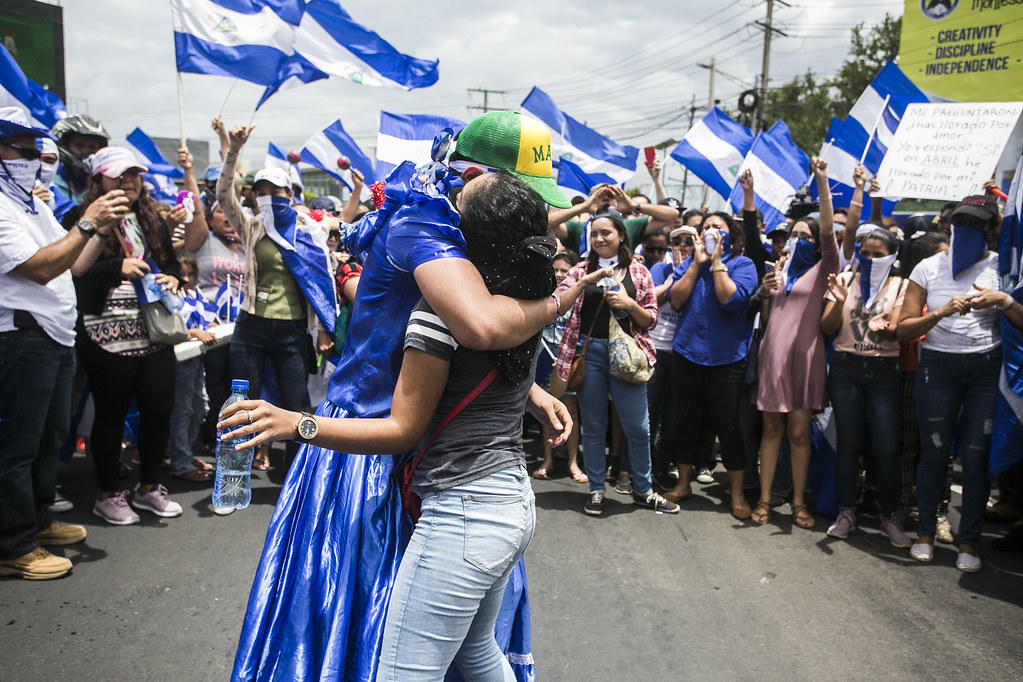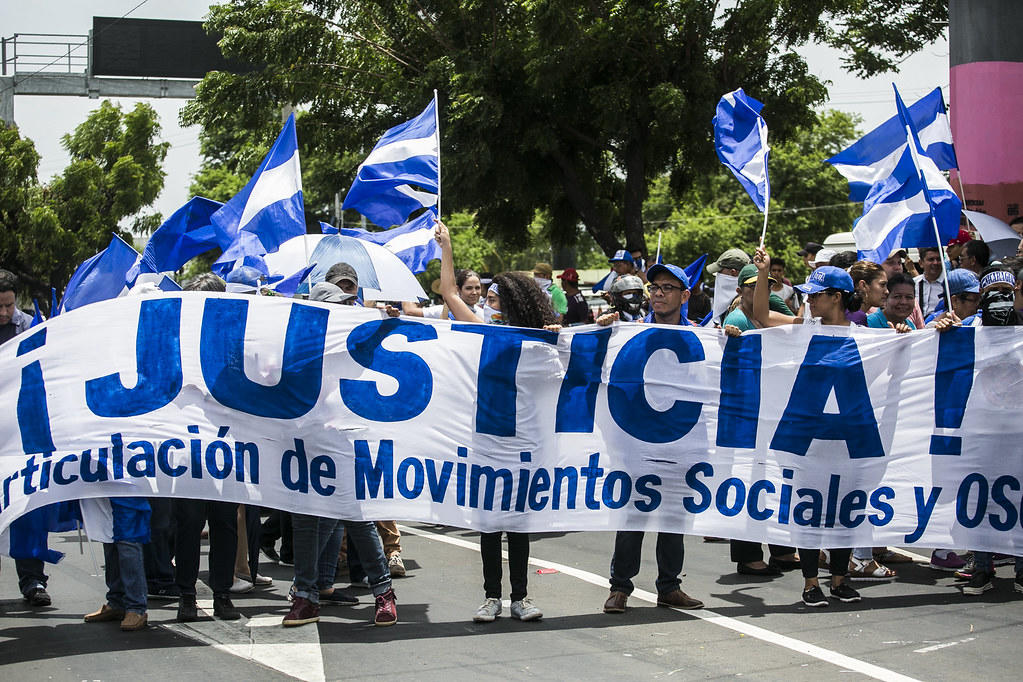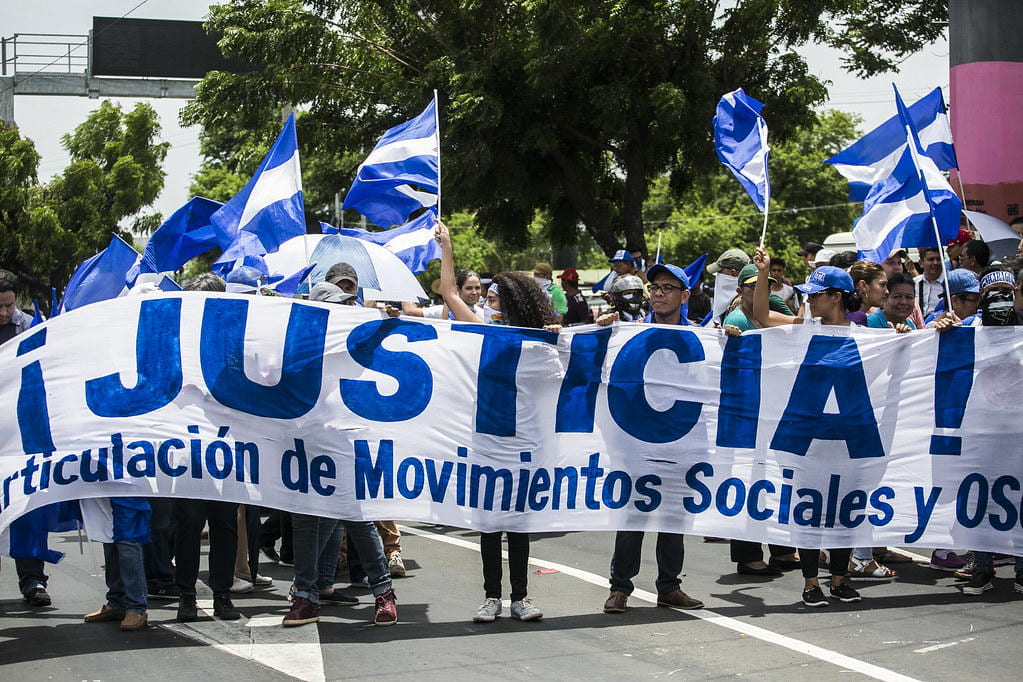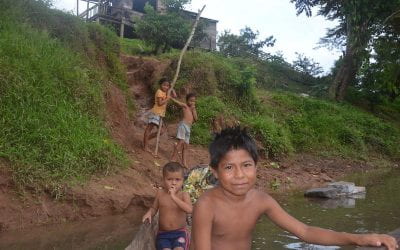The University and the Nicaraguan Crisis
University youth were the first to rise up in April in Nicaragua. Then other young people followed en masse, followed by the rest of the population. The young students woke up an entire country. “They are students; they are not delinquents!” became the first slogan that swept through the streets.
Two events immediately before the April rebellion awoke the conscience of Nicaragua’s millennial youth. In March, Vice-President Rosario Murillo declared that social media were harmful and that laws would be passed to regulate them. And at the beginning of April, a wide swath of the biological Indio-Maíz on the Costa Rican border in southeast Nicaragua began to be ravaged by uncontrollable fires. The country’s young environmental activists demonstrated at the Jesuit Central American University (UCA) in Managua, demanding decisive and urgent action by the government, which never materialized.
On April 16, 2018, President Daniel Ortega gave the green light to reform of the social security system—in bankruptcy because of government mismanagement—and which, among other measures, reduced the pensions of Nicaragua’s senior citizens.
On April 18, members of the Sandinista Youth, the government’s “shock forces,” and masked men on motorcycles repressed protests against the social security reform with extreme violence—excessive force that was becoming the norm. The difference on this occasion was that the following day, April 19, more youth took to the streets to protest in León, Managua, Masaya and throughout the country. They were youth defending their grandparents, the senior citizens who would see their pensions slashed. Students from several Nicaraguan universities took to the streets. And others, who were not university students, began to join their ranks.
The generalized rejection of the regime’s attacks, injustices and abuses had been accumulating for more than a decade. It finally exploded. It was an awakening, an “insurrection of conscience.”
The government’s disproportionate repression swelled in the country’s main cities and many rural towns. “Vamos con todo”—no holds barred— was the order Murillo gave April 19 to the country’s political secretaries. It was the authorization to use any means, as criminal as they might be, to stifle the rebellion.
In Nicaragua, to kill university students is to kill the dreams of poor families. To have a son or daughter in the university is the most sought-after illusion of the country’s poor. To achieve this, they save, they borrow; they make a supreme effort. This fact is fundamental to understand the repudiation of the general public when the regime shot against university students. “We let them get away with everything, but they had never touched our kids,” read a sign held by a woman protester in one of the first Managua marches. Her poster was aimed at President Daniel Ortega. All the regime-controlled institutions, the generalized corruption, all the government abuses could be overlooked, but not killing kids, not shooting at university students.
The Impact of the Repression on the Universities
The universities in Nicaragua suffered the direct impact of the repression against the students. Their campuses were attacked by police and paramilitary forces determined to end the student protests at any cost. Students had holed up on university grounds, defending their universities as spaces of struggle.
The Central American University was not taken over by students, but nevertheless was attacked in front of its gates. It had become a refuge for some of those attacked in the Mother’s Day march, in which 21 people were assassinated over the course of some two hours. In the following days, bullets were found that had hit various parts of the campus. As a result of the hostile environment against the university and its students, our campus was closed for reasons of security. Academic activities were suspended, resuming at year’s end—but only in online classrooms.
The situation did not make us relinquish our role as educators in the UCA. The impact of “no holds barred” was not the one the repressive government desired. On the contrary, the successes of April reinforced the commitment we have with our educational model and with our mission as a university.
While in the state universities, many students have been expelled or their records expunged because of participation in the protests, in the UCA, students count on freedom of expression and opinion. While state university students are silenced because of fear of retaliation, within the UCA campus, students feel secure despite the fact that our university is surrounded by 100-150 police and paramilitary who besiege and intimidate our students and workers every day.
The Reaffirmation of Our Commitment as a University
In the polis —city-states—of the Greeks, social-cultural, economic and political factors modelled the way humans live together. The University, lodged within the city, is a political reality precisely because it models the way citizens should live within the city and the nation. As an educational institution, the UCA, along with the network of Jesuit Universities of Latin America, employs its human and technical resources so that the majorities excluded from the globalized world, and from our Nicaragua, overcome this exclusion and transform their lives. We seek that the university community and our students are in contact with the poorest Nicaraguans, with our less favored fellow citizens.
The University must guarantee good academic formation. This means excellent formation, the practical wisdom of knowledge, contents, research abilities and skills that will be useful to students in the challenges waiting for them in professional life. But if this academic quality does not take into account those who cause human suffering, if it does not take into account all that causes suffering in the human condition, the university will not be responding to the educational project Ignacio de Loyola and the first Jesuits designed for us.
The inequality of opportunities in education for all sectors of the population is possibly the key to the backwardness we experience today in Latin America. The same could be said about Nicaragua. We are in the situation we are because of the negation of equality in educational opportunities.
Looking at education budgets and, even more importantly, observing the culture expressed in the classroom through values, symbols and discourse, the schools and the University appear as spaces that perpetuate social stratification based on discrimination between social classes, between ethnic groups, and between men and women. Authors like Henry show that this perpetuation operates in favor of the system of inequity, He demonstrates “the economic utility of producing large groups of students who see themselves as failures and go on without complaint to the lowest positions in the structures of bureaucratic and industrial work.”
Authentic human development in Nicaragua is one that recognizes and respects cultural, historic and gender diversity as fundamental values with which to construct a better society. Authentic human development also does not disregard the value of the environment and recognizes and respects the social, productive and ethnic richness found in every corner of Nicaragua’s geography.
A university education cannot be reduced to transmitting skills. It demands the identification of our students with values they must assume: a critical spirit, a willingness to dialogue, curiosity to read and research, discipline, rejection of sectarian attitudes; collaboration with others; tolerance; respect for differences; acceptance of other forms of religious beliefs and political sympathies, a sense of commitment.
These values seem outdated in today’s ephemeral culture, described by sociologist Zygmunt Bauman: “Whatever is good for you today can be reclassified tomorrow as your poison. Apparently firm commitments and solemnly signed agreements may be overturned overnight. And promises—or most of them—seem to be made solely to be betrayed and broken.”
The UCA must be present in the marginalized countryside, in the urban shantytowns, supporting the cooperatives, training fisherfolk, accompanying migrants and their families, struggling aside the great number of women heads of households who are trying to achieve a better life for their families, attending to the psychological needs of those who cannot afford private therapy, helping the poor to obtain titles to their land, contributing to the defense of the environment. When our students are enmeshed in all these realities, their research cannot be pure statistics, numbers, variables, tables and charts.
What Should We Keep on Doing?
In the role our students played in the April rebellion, we see the fruits of our educational work. We are filled with satisfaction to hear our students formulate their protests, denounce injustices and propose solutions.
But our work goes on. We still have much to do in our role of University. From its daily academic tasks, our University seeks the power of truth to keep giving our support to the transformations Nicaragua so badly needs. We need to provide a space in which a diversity of beliefs and thoughts can coexist; we believe that advocating and respecting that diversity empowers our daily teaching mission, our research and our tasks of social projection.
A university cannot be neutral; it cannot remain on the sidelines in the face of painful reality. We want to construct a community based on fertile dialogue, asking ourselves always and freely for what we work and for whom we work. Our Jesuit brother Ignacio Ellacuría declared in his last speech just ten days before he was assassinated at the Central American University in El Salvador:
It is often said that the university should be impartial. We do not agree. The university should strive to be free and objective, but objectivity and freedom may demand taking sides. We are freely on the side of the popular majority, because they are unjustly oppressed and because the truth of the situation lies within them both positively and negatively.
Finally, what is the principle challenge of a university faced with human suffering? A university makes sense only when human suffering can enter through its gates and windows because we do not share our classrooms with robots. We should sensitize students to human suffering in each and every subject matter so that they understand that this suffering is part of the academic challenge. If we do not achieve this ethical commitment to feel the pain of others, we are not constructing an academic institution; we are not doing research and we are not projecting socially as a university.
The situation of death and uncertainty experienced in the world today demands that our work in teaching and research has as its final goal our support of this struggle to prevent the suffering of the just and to guarantee the search for truth.
Un análisis de coyuntura nicaragüense desde la perspectiva universitaria
Por José Idiáquez, S.J.
La juventud universitaria fue la primera que despertó en abril en Nicaragua. La siguió la juventud en general. A la juventud la siguió la mayoría de la población. Fueron jóvenes estudiantes quienes despertaron a un país. “¡Eran estudiantes, no eran delincuentes!” fue la primera consigna que se coreó en las calles.
Los antecedentes inmediatos a la rebelión de abril fueron dos: ambos ligados a la conciencia de la juventud millennial de Nicaragua. En marzo, la vicepresidenta, Rosario Murillo, anunció que las redes sociales eran nocivas y que se dictarían leyes para regularlas. Y a inicios de abril, una amplia extensión de la reserva biológica Indio-Maíz, al sureste de Nicaragua, fronteriza con Costa Rica, empezó a ser consumida por un incendio incontrolable. La juventud ambientalista del país se manifestó en la UCA exigiendo del gobierno respuestas más decididas y urgentes, que nunca llegaron.
Cuando lo que llegó fue un diluvio, que sofocó el incendio, el 16 de abril Ortega dio luz verde a una reforma a la seguridad social -en bancarrota por malos manejos del gobierno-, que entre otras medidas reducía las pensiones de las personas de la tercera edad.

El 18 de abril las protestas por la reforma a la seguridad social fueron reprimidas con extrema violencia, como ya era habitual, por “fuerzas de choque” del gobierno, miembros de la Juventud Sandinista y “motorizados”. Lo diferente en esta ocasión fue que al día siguiente, 19 de abril, hubo más jóvenes protestando en León, Managua, Masaya y otros puntos del país. Eran jóvenes defendiendo a sus abuelos y abuelas, a los ancianos que verían reducidas sus pensiones. Estudiantes de varias universidades del país protestaban en las calles. Y comenzaba a unírseles la población.
Ese día se hizo visible el rechazo generalizado de gran parte de la población nicaragüense ante los agravios, injusticias y abusos del régimen. El rechazo se había ido acumulando a lo largo de una década. Y por fin estalló. Fue un despertar, una “insurrección de la conciencia”.
La respuesta del gobierno ante las protestas, que no pararon de crecer desde ese día en las principales ciudades del país, y en buena parte de municipios más rurales, fue una represión desproporcionada. “Vamos con todo” fue la orden que dio Murillo el 19 de abril a los secretarios políticos de todo el país. “Todo” significaba cualquier medio, por criminal que fuera, con tal de sofocar la rebelión.
En Nicaragua matar universitarios significa matar el sueño de las familias pobres. Tener un hijo o una hija universitaria es la ilusión más acariciada por los pobres. Para lograrlo ahorran, se empeñan, se esfuerzan. Esto es fundamental para entender el repudio que provocó que el régimen disparara contra universitarios. “Todo te dejamos pasar, pero jamás hubieras tocado a nuestros chavalos” decía una cartulina que llevaba en sus manos una mujer en la primera marcha que hubo en Managua. Desde ese cartón le hablaba a Daniel Ortega. Todo -las instituciones controladas, los fraudes electorales, la corrupción generalizada-, todo se lo dejaron pasar, pero no que matara a los chavalos, a los jóvenes universitarios.
¿Qué impacto tuvo la represión en las universidades?
Las universidades de Nicaragua sufrieron el impacto directo de la represión contra los estudiantes. Sus campus fueron atacados por fuerzas policiales y paramilitares interesadas en reprimir las protestas estudiantiles al costo que fuera. El objetivo era retirar de los campus a los estudiantes que se habían atrincherado en los mismos, defendiendo sus universidades como espacios de lucha.
La Universidad Centroamericana no fue tomada por estudiantes pero sí recibió un ataque a su portón principal y fue refugio de la población atacada en la marcha del día de las madres, en la que aproximadamente dos horas fueron asesinadas 21 personas. En días posteriores fueron encontradas balas que habían impactado en distintas áreas del campus.
Como resultado del ambiente hostil que reinaba en contra, sobre todo, de los universitarios, nuestro campus fue cerrado por motivos de seguridad. Las actividades académicas fueron interrumpidas y luego retomadas al final del año solamente en modalidad virtual.
En la UCA, la situación vivida no nos hizo desistir de nuestra labor educativa. El impacto del “vamos con todo” no ha sido el deseado por el gobierno represor. Al contrario, los sucesos de abril refuerzan el compromiso que tenemos con nuestro modelo educativo y nuestra misión universitaria.
Actualmente, mientras en las universidades estatales muchos estudiantes han sido expulsados o sus expedientes borrados por haber participado en las protestas, en la UCA la población estudiantil sabe que existe libertad de expresión y libertad de opinión. Mientras los estudiantes de las universidades estatales callan por miedo a represalias, dentro del campus de la UCA, los estudiantes se sienten seguros a pesar de que todos los días nuestra universidad está rodeada por alrededor de 100 a 150 policías y paramilitares que asedian e intimidan a nuestros estudiantes y trabajadores.

¿Cuál es el compromiso que la crisis ha reafirmado en nosotros?
En la polis de los griegos se expresaron los factores socio-culturales, económicos y políticos que modelan la convivencia humana. La Universidad, inserta en la ciudad, es por eso una realidad política. Como institución educativa, la UCA, en sintonía con la Red de Universidades Jesuitas de América Latina (AUSJAL), emplea sus recursos humanos y técnicos para que las mayorías excluidas de este mundo globalizado, y de nuestra Nicaragua, superen la exclusión y transformen sus vidas. Buscamos que toda la comunidad universitaria y nuestros estudiantes estén en contacto directo con los y las nicaragüenses más empobrecidas, con nuestros compatriotas menos favorecidos.
La Universidad debe garantizar una buena preparación académica. Eso significa una excelente formación, un bagaje de conocimientos, de contenidos, de habilidades investigativas y de destrezas que sean útiles a nuestros estudiantes en los desafíos que les esperan en su vida profesional. Pero si esa calidad académica no tiene en cuenta a quienes causan el sufrimiento humano, si no tiene en cuenta todo lo que ocasiona sufrimiento a la condición humana, no estará respondiendo al proyecto educativo que Ignacio de Loyola y los primeros jesuitas nos trazaron.
La negación de una igualdad de oportunidades en educación para todos los sectores de la población es posiblemente la clave de los rezagos que tenemos hoy en América Latina. Lo mismo se puede decir de Nicaragua. Estamos como estamos por esa desigualdad de oportunidades educativas.
Cuando se investigan los presupuestos destinados a la educación y, aún más importante, cuando observamos la cultura que se expresa en las aulas a través de valores, símbolos y discursos, la escuela y la Universidad aparecen como espacios en que se perpetúa la estratificación social basada en la discriminación entre clases sociales, entre etnias, entre hombres y mujeres. Autores como Henry señalan que esa perpetuación es funcional al sistema de inequidad. Hace ver él “la utilidad económica de producir grandes grupos de alumnos que se vean a sí mismos como fracasados y pasen sin quejarse a las posiciones más bajas en las estructuras del trabajo burocrático e industrial”.
Un auténtico desarrollo humano es el que reconoce y respeta la diversidad cultural, histórica y de género como valores fundamentales para construir una sociedad mejor. Un auténtico desarrollo humano no olvida el valor del medioambiente y reconoce y respeta la riqueza social, productiva y étnica de todos los rincones de la geografía nicaragüense.
La educación universitaria no puede reducirse a transmitir competencias técnicas. Exige identificar a nuestros estudiantes con valores que deben asumir: espíritu crítico, disposición al diálogo, curiosidad por investigar y por leer, disciplina, rechazo a actitudes sectarias, colaboración con los demás, tolerancia, respeto a las diferencias, aceptación de las diversas creencias religiosas y simpatías políticas, sentido del compromiso…
Estos valores parecen pasados de moda en la actual cultura, donde todo es efímero. Así describe esta cultura de hoy Zygmunt Bauman: “Cualquier cosa que hoy es buena para ti puede reclasificarse como tu veneno. Compromisos aparentemente firmes y acuerdos solemnemente firmados pueden derrumbarse de la noche a la mañana. Y las promesas, o la mayoría de ellas, parecen hechas solamente para ser traicionadas y rotas”.
La UCA está obligada a estar presente en el campo marginado, en las zonas urbanas empobrecidas, apoyando a las cooperativas, capacitando a los pescadores, acompañando a los migrantes y a sus familias, luchando a la par de tantas mujeres que sacan adelante a sus familias, atendiendo sicológicamente a quienes no tienen posibilidad de pagar un servicio privado, colaborando en la legalización de las propiedades de los más pobres, contribuyendo a la defensa del medioambiente… Cuando nuestros estudiantes se encuentren con todas estas realidades, sus investigaciones ya no serán puros datos estadísticos, números, variables, tablas y cuadros.
¿Qué seguiremos haciendo?
En el papel que nuestros estudiantes asumieron en la rebelión de abril vemos los frutos de nuestro trabajo educativo. Nos llena de satisfacción escuchar a nuestros estudiantes formular sus protestas, denunciar injusticias y proponer soluciones.
Pero nuestro trabajo sigue. Desde la Universidad tenemos aún mucho por hacer. Desde el quehacer académico, nuestra Universidad busca el poder que tiene la verdad para así seguir dando nuestro aporte a las transformaciones que necesita Nicaragua. Y como lo que caracteriza a la Universidad y al mundo universitario es ser el espacio en donde convive la diversidad de credos y de pensamientos, creemos que es acoger y respetar toda esa diversidad la que va a potenciar nuestro quehacer docente, nuestras investigaciones y todas nuestras tareas de proyección social.
Una Universidad no puede ser neutral, no puede permanecer impasible ante la dolorosa realidad. Queremos construir una comunidad en diálogo fecundo, preguntándonos siempre con libertad para qué trabajamos y al servicio de quiénes trabajamos. Bien lo sabía nuestro hermano Ignacio Ellacuría. En su último discurso, pronunciado diez días antes de ser asesinado en el campus de la Universidad Centroamericana de El Salvador, afirmaba:
Suele decirse que la Universidad debe de ser imparcial. Nosotros creemos que no. La Universidad debe pretender ser libre y objetiva, pero la objetividad y la libertad pueden exigir ser parciales. Y nosotros somos libremente parciales a favor de las mayorías populares, porque son injustamente oprimidas y porque en ellas, negativa y positivamente, está la verdad de la realidad.
Finalmente, ¿cuál es el principal reto de una universidad de cara al sufrimiento humano? Una universidad tiene sentido siempre y cuando por sus portones y por sus ventanas entre el sufrimiento humano pues no compartimos nuestras aulas con robots. Debemos sensibilizar a nuestros estudiantes, en cualquiera de sus materias, para que comprendan que el sufrimiento humano es parte del desafío académico. Si no logramos ese compromiso ético de sentir como propio el dolor ajeno, no estamos haciendo academia, no estamos haciendo investigación y no nos estamos proyectando socialmente como universidad.
La situación de muerte e incertidumbre que se vive en el mundo exige que nuestro trabajo en la docencia y la investigación tenga como fin último dar nuestro aporte en esa lucha por evitar el sufrimiento del justo y asegurar la búsqueda de la verdad.
Spring/Summer 2019, Volume XVIII, Number 3
José Idiáquez, S.J., known as “Padre Chepe,” is the president of the Central American University in Managua. He received the LASA/Oxfam America Martin Diskin Memorial Lectureship Award in May 2019.
José Idiáquez, S.J., conocido como “Padre Chepe,” es rector de la Universidad Centroamericana en Managua. Recibió el Premio LASA/Oxfam America Martin Diskin Memorial Lectureship en mayo 2019.
Related Articles
Nicaragua TEMPLATE: Single Language Article
English + Español
A one or two sentence blurb about the article
3, 2, 1… poemas
Manual para sobrevivientes…
Accompanying a Search for Self-Determination
English + Español
The small indigenous Mayagna community of Awas Tingni in the interior forest of Nicaragua’s Caribbean Coast made legal history in the 1990s when they faced an incursion by an international lumber company. The community mapped its land claims and brought a case…





